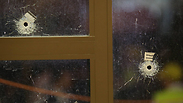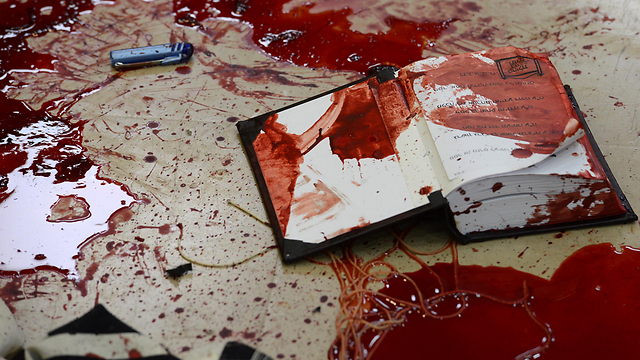
Scene of Tuesday's synagogue attack. 'The problem is not the weapon, but the terrorists' motivation'
צילום: גיל יוחנן
The truth must be told: Terror cannot be destroyed
Op-ed: Even in case of true peace between Israel and the Arab world, there will always be an individual or a group that will take the road of terror. This is our life in this world.
1. Kaddish: Yitgaddal veyitqaddash shmeh rabba (May His great name be exalted and sanctified).
2. Eradication: A minute after a terror attack is announced, the prattlers stand up and demand that the government, the army, the security service and all the people of Israel "eradicate," "defeat" and "destroy" terror. After sixty-six years – and some will, rightfully, say 120 years – of Arab, Palestinian and other terrorism, with thousands of people killed, they still repeat the lexicon of "eradication," "destruction" and other words which basically only excite the speakers themselves. They suggest deporting millions to another country, destroying homes, arresting family members.
Well, here's the truth: We have tried almost everything. We have deported. We have destroyed. We have arrested. Experience shows, again and again, that we cannot "eradicate" and "destroy" terror. We can, perhaps diminish it, reduce the number of attacks, sometimes for a few quiet years. But terrorism is part of the existence of Muslims who don’t make a big deal out of decapitations, for example.
From our masters, our civilian and military leaders, we have learned that even in case of true peace between us and the Arab world, there will always be an individual or a group that will take the road of terror. This is our life in this world. "Who's next and who will follow?" as the sad song says.
3. Initiative: These days, even a nail file is a weapon. Definitely a penknife. A knife. An axe too. The problem is not the terrorists' weapons. Out problem is their motivation, the urge to go out and commit the dreadful act. It's almost ridiculous to suggest that we conduct a house-to-house search in the villages of the territories and even in the villages of Israel's minorities. There is hardly a single house which doesn’t have some kind of weapon in it.
After the occupation of Gaza in 1967, for example, the Shin Bet estimated that the residents have thousands of weapons. Searching for them is like chasing the wind. We hid weapons during the British Mandate period. The Arabs learned from us. The Jewish mind invented patents. The enemies found their ways too.
The truth is that in many cases, like on Tuesday, a lone terrorist – or a pair of terrorists – will accomplish his mission. Perhaps because he is the only person in on the secret. The initiative always comes from the terrorist. He chooses the target and the victim or victims and he can change direction at the last moment. That is why this type of terror is usually extremely dangerous.

Jerusalem synagogue after Tuesday's terror attack. 'We thought that after the State of Israel's establishment, we had gotten rid of these sights once and for all' (Photo: Kobi Gideon, GPO) (צילום: קובי גדעון, לע"מ)
4. Holocaust: Tuesday's terror attack at Jerusalem's Har Nof neighborhood may have hit us harder than other similar incidents, and one of the reasons is that it brought back the horrors and images of the Holocaust. Jews wrapped in prayer shawls and phylacteries. And blood, a lot of blood.
We thought that after the State of Israel's establishment on the ashes of the Holocaust's victims, we had gotten rid of these sights once and for all. It turns out we haven't.
5. Special discussion: We have apparently found the appropriate response to terror. Each time, an hour or two after every terror attack, we are informed that the prime minister has announced a special discussion. The internal security minister has called a special discussion. The police commissioner has convened a special meeting. The mayor has assembled the council members. How do they have time to think about striking terror when they keep talking all the time?
Another term different leaders have become fond of in the past few years is "an evaluation of the situation." For decades, leaders are briefed on evaluations of the situation, and how can they possibly do anything different? And the leaders always announce with great importance that they are holding evaluations of the situation. Perhaps it's time to talk and write about "the situation" itself?
6. The end: The answer to the popular question "how will it end?" seems to be that it won't end. What is presumably needed here, and I would like to stress the word "presumably," is a long-term investment in the education of our neighbors about love and good neighborly relations from a very early age. Leaders who are capable of changing the mindset of people who think Jews don’t deserve to live have apparently not been born yet.
Wednesday marked the anniversary of the Egyptian President Anwar Sadat's unprecedented visit to Israel in 1977. Here's an example of a leader who changed a mindset even his people did not share his enthusiasm. And Prime Minister Menachem Begin of course. If only we had such leaders. The Messiah will probably arrive before they do.










